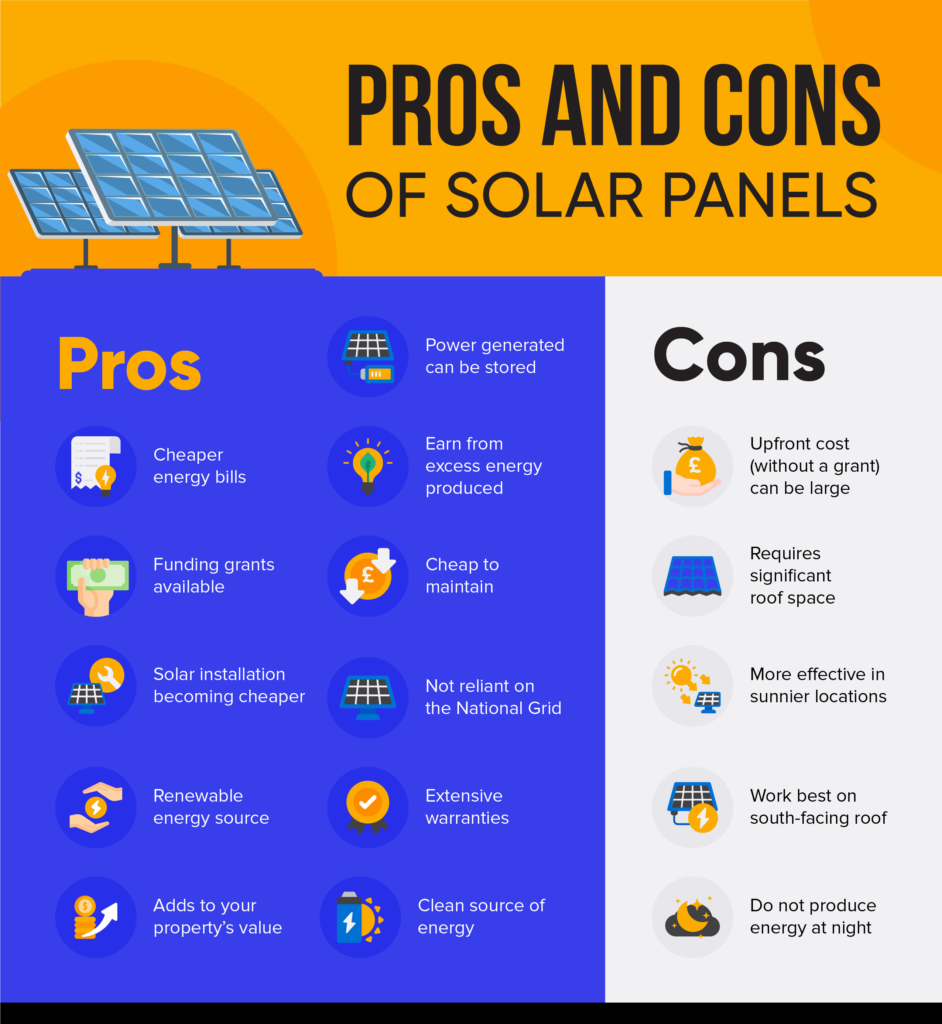The world is changing. Climate change is a reality, and the time has come for us to shift our focus toward renewable energy sources. One of the most popular choices when it comes to renewables is solar panels because they can be set up on the roof of your home and provide all the energy you need.
But what are the pros and cons of solar panels? And will the money they save you on bills justify your upfront costs?

The Pros of Solar Panels
UK Government Grants
From April 2022, the UK government started offering ECO4 solar grants to encourage homeowners to switch to renewable energy sources. This grant can provide you with up to £5,000 towards the cost of purchasing and installing your solar panels.
To qualify for the grant, you need to have:
- An annual household income of less than £31,000
- Claim eligible benefits
- Have an Energy Performance Certificate D, E, F or G.
- Currently have an inefficient home heating system.
Cheaper Energy Bills
Solar panels can help significantly reduce your household or business energy bills. This is because, once they are installed, they provide you with free energy which can offset the cost of the electricity you use from the grid. This is one of the main reasons why people choose to install solar panels.
In some cases, solar panels can completely eliminate your energy bills but this will depend on the size of your system, how much sun you get, and how much energy you use. The best thing to do is to speak to a solar panel expert who can give you an estimate of how much you could save. Enter your postcode here to find out more about how much you could save on your energy bills.
Renewable Energy
Solar panels are a renewable source of energy which means they can never run out. This is in contrast to fossil fuels like coal and oil which are finite resources that will one day be depleted.
Added House Value
Solar panels can also increase the value of your home because they are seen as a desirable asset by many homebuyers and can make your property more attractive to potential buyers. In fact, installing solar panels could increase the value of your home by up to 10% depending on where it is and the size of the system.
Environmental Benefits
Solar panels offer a clean and green source of energy that doesn’t produce any harmful emissions or pollution. This is in contrast to fossil fuels which release harmful gases into the atmosphere when they are burned, contributing to air pollution and climate change.
Cheap Maintenance
Solar panels are very low maintenance and only require an annual check-up to ensure they are working properly. This is much cheaper than other forms of renewable energy like wind turbines which require regular servicing and repairs.
To ensure your solar panels last a long time, it’s important to have them installed by a qualified professional. They will be able to advise you on the best location and type of solar panel for your needs as well as provide a maintenance plan. You can insert your postcode here to find out more about installation professionals in your local area.
Energy Independent Homes
Solar panels can make your home energy independent which means you will no longer be reliant on the grid. This is a huge advantage for many people as it gives them complete control over their energy supply and makes them less vulnerable to power cuts and blackouts.
Excess Energy Can Be Sold to the Grid
In most cases, your solar panels will produce more energy than you need during the daytime. If your home is connected to the grid, you can sell all this excess energy back to the energy companies. This is a great way to earn some extra money while also helping the environment. All you need to do is register as a ‘feed-in tariff’ customer with your energy supplier and they will pay you for the electricity you produce.
Power Can Be Easily Stored
Solar panels also have the advantage of being able to store power for use at night or during a power cut. This is possible because the panels are often used in conjunction with batteries which store the excess electricity produced during the daytime.
Extensive Warranties
Solar panels usually come with extensive warranties of up to 25 years. This means you can have complete peace of mind that your investment will last for many years to come. The warranty should cover both the panels and the inverter (the device which converts solar power into electricity) and will ensure you are not left out of pocket if anything goes wrong.
Solar Panels are Becoming Cheaper
The cost of solar panels has fallen massively in recent years, making them more affordable than ever before. In 2010, the average cost of installing a solar PV system was around £12,000. Today, the same system would cost less than half that amount at just £4,800.
The falling cost of solar panels is due to a number of factors including economies of scale, advances in technology, and increased competition in the market. This has made them an increasingly attractive investment for many people as the return on investment has become much higher.
The Cons of Solar Panels
Upfront Costs Can be High
The main downside of solar panels is the upfront cost. Although the prices have fallen dramatically in recent years, they are still quite expensive to purchase and install. This means it can take a long time to recoup your investment and start seeing a return on your money.
You May Need a Lot of Space
Another potential downside of solar panels is that you need a lot of space to install them. This is because most systems require around 15-20 square metres of roof space in order to generate enough electricity to power your home. However, many people don’t have enough space on their roof, or their roof isn’t orientated in the right direction to make solar panels a viable option.
Solar Panels Work Best in Sunny Weather
Solar panels need sunlight in order to generate electricity so obviously, they are most effective in sunny weather. This means they are not as effective in the UK as they are in other countries such as Spain or Australia where the weather is much sunnier. This is what puts off many British people from making the switch to solar power.
No Energy is Produced at Night
Solar panels only produce electricity during the daytime when the sun is shining. This means you will need to use other sources of energy such as the grid to power your home at night. This can negate the entire point of switching to solar power if you are trying to reduce your reliance on fossil fuels.
One way to get around this is to install batteries that can store the electricity generated by your solar panels during the day and release it at night. This will allow you to run your home entirely on renewable energy even when there is no sunlight.
Alternatively, you could consider using a ‘time of use’ tariff which is cheaper at night. This would mean you would still be using some energy from the grid but it would be much cheaper than during the daytime.
To Sum Up
As you can see, “what are the pros and cons of solar panels” is a question that requires a lot of careful consideration. There are various advantages and disadvantages to taking into account before making a decision. However, the pros generally outweigh the cons and solar panels are becoming an increasingly popular choice for those looking to switch to renewable energy.
If you’re thinking about making the switch to solar power, enter your postcode here to find out more about local installation services and to find out if you are eligible for a government grant. With the whole world looking to make the shift to renewables, now is the perfect time to take advantage of solar power.
